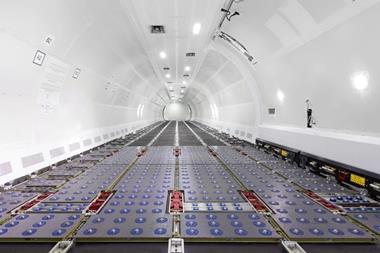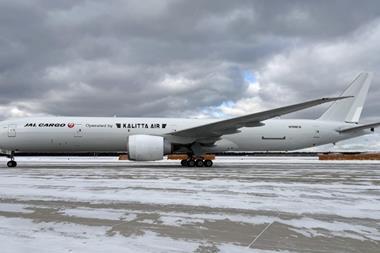The launch of new Chinese express airline United Star Express is now expected before the end of 2017, but the carrier’s joint venture partners are already starting work on building the fleet.
The new airline, a joint venture between US aviation firm ATSG, airline Okay Airways and online retailer VIP Shop Holdings, had originally been planned for launch in 2016.
However, delays in obtaining approvals mean the launch has been delayed.
Speaking at the Stifel Transport and Logistics conference, ATSG chief commercial officer Richard Corrado said: “We are about half way through our process right now and hope to have the airline up and flying in China by the end of 2017.”
Corrado said the partners were wasting no time in securing aircraft so they were ready for launch.
He added that the process ATSG was going through to secure and convert the United Star Express aircraft demonstrated how its new business model will work following the recent acquisition of conversion and MRO house, Pemco.
“Last weekend we went out and specked two [Boeing 737] feedstock aircraft,” he explained. “Going forward we’ll look to buy those aircraft, we’ll give them to Pemco, we’ve got a couple of [conversion] slots reserved, Pemco will get the conversion of those aircraft, and [ATSG leasing arm] CAM will lease them to our partner Okay [Airways].
“Okay will fly them in China, and then look to the joint venture. When that Air Operator’s Certificate is approved, we’ll move the airplanes, the crews and the management focus over to the joint venture.”
When the express airline was first announced, the partners said it would principally serve the growing air cargo express market in China and surrounding countries.
For the first year of operations the new airline will utilise six small and midsize freighter aircraft including Boeing 737, Boeing 757 and Boeing 767 aircraft.
Later questioned on the potential of the Chinese e-commerce market, Corrado said that today the majority of shipments move on the ground and only a small fraction by air, but added the market was growing fast.
“One of the reasons we are putting these two B737s into an Okay certificate – our partner certificate – is that we are seeing all these opportunities go by and we wanted to get some revenue flowing into the business.”
Corrado added that ATSG is hoping that B767 freighters, the aircraft that dominates the ATSG fleet, will also find a place in the Chinese market.
He said: “We do look to get the B767s into China, hopefully by the end of 2018. We think there is a good market not only within China, given the fast pace of e-commerce growth, but also with the trading partners with China in the region, countries like Korea, Vietnam, Singapore - the partners that trade with China in terms of components going one way and finished products going the other.”
During the event, the aircraft lessor also spoke of customer Amazon’s decision to switch from ATSG’s Wilmington hub to its own set up in Cincinnati in the future.
Corrado said that it would have liked Amazon to have maintained its hub in Wilmington because it would have been good for the local community, but added that there were some positive to be drawn from the statement put out by the e-commerce firm, which is in the process of setting up its own air network with 20 aircraft leased from ATSG and a further 20 from Atlas.
“[Running the hub] wasn’t a key part of our long term plan − we figured that if they developed a large hub they probably would have taken over the operation themselves.
“But as it stands, if you’ read the press release [on the hub], they talked about the fact that they would have sufficient parking for 100 aircraft.
“Today they have committed to 40 − 20 from us and 20 from Atlas − so if you look down the road in two or three years when they have their hub up and running we would see it as a great opportunity for us to continue to deploy assets with them as they grow that fleet potentially out to 100 or more than 100.”










